In honor of his 80th birthday, today we fill the Animation Spin bill with fowl material from three decades of Donald Duck discs.

DISNEY’S GOIN’ QUACKERS
Disneyland Records #2513 (12”33 1/3 RPM / Stereo / 1980)
CD Reissue: Walt Disney Records 60355-7 (1995)
Available for Download from Walt Disney Records
Producer: Jymn Magon. Children’s Choral Director: Betty Joyce. Running Time: 27 minutes.
Performers: Clarence Nash (Donald Duck); Tony Pope (Goofy); Peter Renaday (Mickey Mouse); Phil Baron (Phillio); Will Ryan (Willio); Larry Groce, The Disneyland Children’s Sing-Along Chorus.
Songs: “Goin’ Quackers” by Will Ryan; “A Waddlin’ Crazy Guy,” “Vacuum Cleaner Hoses” by Phil Baron; “Harris the Bullfrog,” “The Fly and the Flea” by Larry Groce; “I’m In Love with a Big Blue Frog” by Lester Braunstein; “If I Only Had a Brain” by Harold Arlen and E.Y. Harburg; “On Top of Spaghetti” by Tom Glazer; “The Horses Run Around,” “Turkey in the Straw,” “The Limerick Song,” “Dueling Quackers,” “Daddy’s Whiskers,” “Throw it Out the Window” (Public Domain).
Donald Duck is a major movie and TV star, but his recording career was getting soft in the ‘60s. Along with Mickey and other major Disney cartoon characters, Donald was not seen as frequently in theaters and TV as in earlier decades, so it followed that fewer records would feature him. Most Disney Character records were compilations of previous recordings until the late ‘70s, when Mickey Mouse Disco’s unprecedented success prompted a new wave of Disney character-related records that continues today.
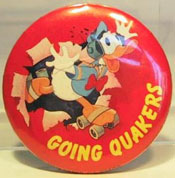 The producer who made it happen was Jymn Magon, who was brought in to produce a slew of Disney Little Golden Read-Alongs—very quickly. He hired the very prolific composer/performer, Larry Groce, who later sang and played on a best-selling series of Children’s Favorites albums for Disney.
The producer who made it happen was Jymn Magon, who was brought in to produce a slew of Disney Little Golden Read-Alongs—very quickly. He hired the very prolific composer/performer, Larry Groce, who later sang and played on a best-selling series of Children’s Favorites albums for Disney.
Groce contributed two original funny folks songs to Goin’ Quackers, but it still needed more than a dash of comedy madness. “I can’t remember exactly how we originally connected, but Willio and Phillio—Will Ryan and Phil Baron—had sent me a copy of their album, which was fun and enchanting,” Jymn Magon recalls. “I got in touch with them about songwriting for the Goin’ Quackers album, but it quickly became clear they should be the performers on the album, as well.
“We all convened in Nashville at Odyssey Studios to record the tracks we had put together. Several tunes were public domain (“Daddy’s Whiskers,” “Turkey in the Straw,” etc.), but others were written by Will and Phil (“Goin’ Quackers,” “Vacuum Cleaner Hoses,” “A Waddling Crazy Guy,” etc.), which they also performed. All in all, it was a lot of fun to record.”
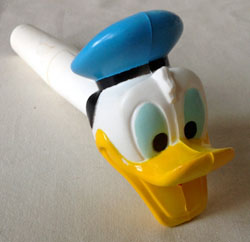 The album cover boasts funny liner notes with “critical raves” like “These guys are insane!” (The Mad Hatter) and “Kept me awake!” (Sleeping Beauty)—written by Magon, Baron and Ryan. There are several inside jokes, too, like a reference to another famous duck in “(“Mother!”) in “The Horses Run Around” and even a Star Wars nod.
The album cover boasts funny liner notes with “critical raves” like “These guys are insane!” (The Mad Hatter) and “Kept me awake!” (Sleeping Beauty)—written by Magon, Baron and Ryan. There are several inside jokes, too, like a reference to another famous duck in “(“Mother!”) in “The Horses Run Around” and even a Star Wars nod.
“In ‘Vacuum Cleaner Hoses,’ which was turned into a music video, Phil Baron, who wrote and sang it, had slipped in a science fiction quote in the lyrics,” recalls Jymn. “I racked my brain and finally found it: ‘a wretched hive of scum and villainy’—that was Obi-Wan Kenobi’s description of Mos Eisley!”
There was also a video of the “Goin’ Quackers” song on the Donald Duck 50th Birthday TV special. At Disneyland’s Donald Duck birthday parade, kids were given a 45 RPM single and thousands of plastic quackers were given out. “Will and Phil encouraged the Disney music company to do a tie-in with the Mickey Mouse Reunion that was being filmed,” Jymn adds. “I have a picture somewhere of Will, Phil and Annette Funicello blowing on a specially made Donald duck call—and a similar photo with Ducky Nash.”
Jymn was kind enough to share a few one-of-a-kind mementos of the experience (click thumbnails below to enlarge). “Will and Phil were very involved with Quackers (also “Pardners” and the Christmas album), because I think they saw these as stepping stones to Hollywood, where they eventually moved. I received a lot of fun missives them containing suggestions regarding their songs.”



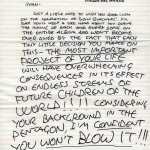

Unused Cover Concept
GIVE A LITTLE LISTEN
Excerpt from “Dueling Quackers”
“Goin’ Quackers” is loaded with songs that had always seemed tailor-made for comic hijinks with the characters, like “If I Only Had a Brain” for Goofy, and this well-known tune, reconfigured to drive Donald crazy and infuriated.

THE FIRST WILLIO & PHILLIO RECORD IN THE WORLD
Wizard Records W-A101 (12”33 1/3 RPM / Stereo / 1979)
Producers/Performers: Will Ryan, Phil Baron. Art Direction: W.Z. Ryan. Cover Art: J. Montgomery Elliott. Photography: Marianne Pojman. Logo: David Helton. Typography/Print Production: John Schambach. Recorded at Suma Recording and D.B. Studios, Chicago. Running Time: 33 minutes.
Songs: “Can You Live with Love?” “It Sure Feels Like Love” by Phil Baron; “All Winter Long,” “Eldorado Sue,” “I Like People,” “I Hate People,” “The Cleveland Stroll” by Will Ryan; “Can’t Stand That Disco” by Will Ryan, Phil Baron, Jim Tullio and Elliott Delman; “O Mistress Mine” by Will Ryan, Phil Baron and William Shakespeare; “Eureka!” by Will Ryan and Jim Sikela.
This is the album that impressed Jymn Magon and led to the migration of Will Ryan and Phil Baron from the Midwest to the California coast. An eclectic blend of satiric songs, ballads, rock and country-western styles, the album foreshadows music and comedy that both artists would soon bring to the Disneyland label, the Disneyland Park and numerous TV projects.
Ryan and Baron flourished in Los Angeles, both becoming top animation voice actors. Phil’s many roles include the voice of Teddy Ruxpin, the animatronic bear, as well as Piglet on Welcome to Pooh Corner. Will sang for Eeyore and voiced Rabbit and Tigger in countless animated films and radio shows, including The Little Mermaid, Adventures in Odyssey and most recently, Get a Horse! (as Pete, whom he also voices on Mickey Mouse Clubhouse).
Today. Phil dedicates his trained, skilled singing voice to a power even higher than Disney: as a cantor at Valley Beth Shalom in the San Fernando Valley. In addition to voice work, Will appears on camera in the 1930’s inspired comedy starring the venerable team of “Biffle and Shooster.”
GIVE A LITTLE LISTEN
“The Cleveland Stroll”
Willio & Phillio were a popular touring musical act throughout the ‘70s, with concert appearances in clubs, TV shows and campuses. In their native Cleveland, they developed an especially large and loyal following. This song was recorded at the “Historic First Official Meeting of the Willio and Phillio Glee Club.”
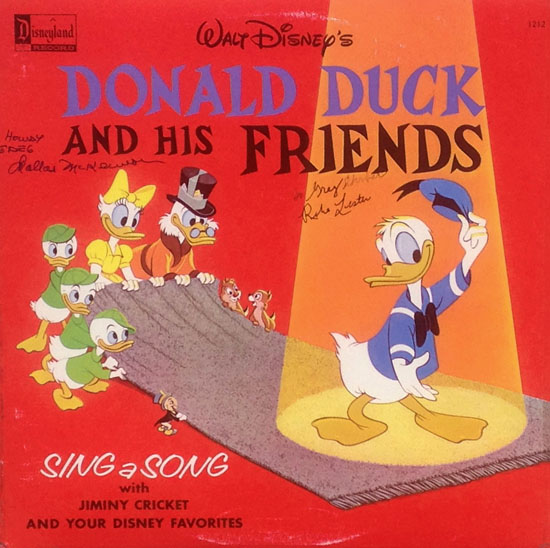
WALT DISNEY’S DONALD DUCK AND HIS FRIENDS
Disneyland Records DQ-1212 (12” 33 1/3 RPM LP / Mono / 1960)
Executive Producer: Jimmy Johnson. Producer: Camarata. Running Time: 17 minutes.
Performers: Clarence Nash (Donald Duck); Cliff Edwards (Jiminy Cricket); Jimmy Macdonald (Mickey Mouse, Goofy); Gloria Wood, Robie Lester (Chip, Dale, Three Little Kittens); Dal McKennon (Uncle Scrooge).
Songs: “Chip and Dale” and “Crazy Over Daisy” by Gil (Hazel) George and Oliver Wallace “Alouette,” “Hail, Hail, The Gang’s All Here,” “I’ve Been Working On the Railroad,” “We Boys Will Shine Tonight,” “Clementine,” “The Bear Went Over the Mountain,” “Pony Boy,” “Oh Susanna,” “Billy Boy,” “I’m a Little Prairie Flower,” “Loch Lomond,” “Kookaburra,” “Polly Wolly Doodle,” “Row, Row, Row Your Boat,” and “For He’s a Jolly Good Fellow” (Public Domain).
Story: “Uncle Scrooge’s Rocket to the Moon.”
On this, one of the rare Disney Character albums of the early Disneyland Records days, Jiminy Cricket hosts a singing party honoring Donald Duck, who is constantly prevented from singing his own song before everyone else does (remember when this also happened on The Brady Bunch Variety Hour?).
 Donald Duck and His Friends is a very strange album, generous in its use of characters and large number of songs, yet chintzy in its short length and the near-total absence of musical accompaniment. With few exceptions, every song is performed a capella. It’s almost as if some music tracks were planned and later canceled. There are also quite a few scouting songs (even some of old favorites with scout-related lyrics), prompting a theory that the album may have been initially conceived to tie into the Cub Scouts and Brownies.
Donald Duck and His Friends is a very strange album, generous in its use of characters and large number of songs, yet chintzy in its short length and the near-total absence of musical accompaniment. With few exceptions, every song is performed a capella. It’s almost as if some music tracks were planned and later canceled. There are also quite a few scouting songs (even some of old favorites with scout-related lyrics), prompting a theory that the album may have been initially conceived to tie into the Cub Scouts and Brownies.
The only times that instruments are heard are in Jiminy’s solos (probably Cliff Edwards himself on his ukulele) and a piano behind Chip and Dale. The chipmunk duo’s theme sounds like the same voice track heard on a Wonderful World of Color episode from that time period. They also sing “Crazy Over Daisy” from the Donald cartoon of the same name. The disc label calls it “Daisy, Daisy.” This melody was also heard as “Meet Me Down on Main Street.”
This album is historically important because it marks the first time the internationally renowned comic book star Scrooge McDuck was ever heard, making Dal McKennon technically the first actor to play him. Scrooge would not appear on screen until 1967’s Uncle Scrooge and Money, voiced by Bill Thompson. (Alan Young currently holds the longevity record as the voice of Scrooge since 1974.)
GIVE A LITTLE LISTEN
“Space Scrooge”
This short story was also released as a 45 RPM record. In 1972 it was used as part of the compilation album, The Mouse Factory Presents Mickey and His Friends. As you’ll hear, it cries out for some background or at least transitional music. But it’s still very cool and it even mentions the Beagle Boys—also a first for records.


 GREG EHRBAR is a freelance writer/producer for television, advertising, books, theme parks and stage. Greg has worked on content for such studios as Disney, Warner and Universal, with some of Hollywood’s biggest stars. His numerous books include Mouse Tracks: The Story of Walt Disney Records (with Tim Hollis). Visit
GREG EHRBAR is a freelance writer/producer for television, advertising, books, theme parks and stage. Greg has worked on content for such studios as Disney, Warner and Universal, with some of Hollywood’s biggest stars. His numerous books include Mouse Tracks: The Story of Walt Disney Records (with Tim Hollis). Visit 

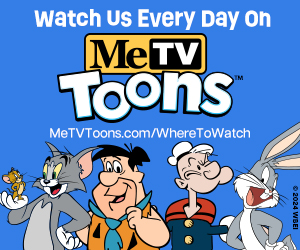




















































This album is historically important because it marks the first time the internationally renowned comic book star Scrooge McDuck was ever heard, making Dal McKennon technically the first actor to play him.
Fortunate for us he didn’t get a regular gig out of it. It warmed me to hear classic Nash as Donald interact with Scrooge, but like most of McKennon’s vocals, the accent was too aggressive. And just a shout out to Will Ryan, who did my favorite Scrooge voice in SOCCERMANIA.
Thanks for reminding us of Will’s Scrooge voice work, Thad.
I would imagine that Scotsman Craig Ferguson would describe Dal’s performance as “Pakistani.”
Will and Phil also did voices for The Disney Channel’s “Welcome to Pooh Corner” (Will Ryan voiced Tigger and Rabbit, while Phil Baron voiced Piglet).
And Phil reunites with Will when he plays Max Davidson in the next Biffle & Shooster short, BRIDE OF FINKLESTEIN (shooting next month).
The Donald Duck and Friends album is also significant in that it seems to be the only time on records that Jiminy Cricket acted as conscience for anybody else besides Pinocchio.
The album definitely has its share of “quirks.” In addition to the almost total absence of instrumental accompaniment for the songs as mentioned above, the songs themselves seem to be randomly-chosen folk songs that have no particular relevance to the characters. The ballad “My Darling Clementine” about the death by drowning of a miner’s daughter, seems especially inappropriate for an album so obviously aimed at young children…although Donald does do a nice editorial comment when he quacks out, “Oh–how sad!” And since when are Huey, Dewey, and Louie “good cub scouts”? Everyone knows they are “good Junior Woodchucks.” It also seems an odd choice to refer to the three girl singers as “The Three Little Kittens.” The only Disney version of three kittens in those pre-Aristocats days would have been The Three Orphan Kittens from the Silly Symphonies, and they did not speak. It would have made more sense to use Daisy’s nieces, April, May, and June for the brownie songs. The version of “Billy Boy” that is sung uses lyrics that I have never heard in any other version, and seems very watered down from the original purpose of the song. Jimmy McDonald, who was on hand to do the voice of Mickey Mouse on Side One, does the voice of Goofy on Side Two, as evidently Pinto Colvig, the one and only true Goofy voice, must have been unavailable. McDonald’s Goofy is a poor substitute for the true voice. McDonald makes Goofy sound as though he is lacking in intelligence, while Colvig’s vocalization never had to resort to a low, dumb-sounding voice, but instead conveyed that Goofy simply had his own unique sense of logic without necessarily making him sound stupid. Also, just before Donald begins his rendition of “Row Row Row Your Boat,” there are two female voices which are evidently non-speeded up versions of Chip ‘n’ Dale’s voices which say, “We’ll help him.” It is an extremely tacky error, and I’m very surprised someone didn’t do better quality control. It’s glaringly obvious that someone forgot to speed up Chip ‘n’ Dale’s voices for that one line.
The Uncle Scrooge story is fun, but it is also the only story portion on the entire record, and it seems out of place–I’m not saying it shouldn’t be there, only that there should have been more story elements on the album to make it fit better. The story itself contains a few non-sequiturs, most glaringly the gag about the dime–which is never resolved. And how is it that the young listeners are expected to have an idea who Uncle Scrooge is and who the Beagle Boys are, yet they are not expected to know that Donald’s nephews are Junior Woodchucks and not cub scouts?
Last but not least, Daisy appears on the cover of the album and is even referenced in one of the songs sung by Chip ‘n’ Dale, yet does not attend Donald’s party–at least not as a singing guest. Seems to be yet another glaring omission. A party for Donald without Daisy? C’mon!
There are many pluses to the album, however, particularly the interplay between Cliff Edwards as Jiminy Cricket and Clarence Nash as Donald.
I truly do appreciate and enjoy this album–but some of the oddities about it really leave me wondering about who was in control. Definitely not Walt, or these errors would have been fixed.
Frederick,
Your comments are always so detailed and thoughtful! A few thoughts on your thoughts:
I’ve also found it weird that the tragic “Clementine” is (or was) considered a children’s song. It actually is the last song on a Golden LP called “Songs to Tickle Your Funny Bone!” At the Hoop-Dee-Doo Revue in Walt Disney World, it is reenacted in a comical way, but at least the spoof acknowledges the sadness.
The April, May June thing — same here. What’s the deal with using kittens?
Mickey sings with a vibrato not unlike Tiny Tim. Sorry to be so snide, I still love this album and have the highest regard for Disney Legend Jimmy Macdonald, but his Mickey is like Captain Kangaroo’s Mister Moose and his Goofy is indeed too dumb. I agree that Goofy isn’t stupid, just naive and childlike. He tries very hard to figure things out but often gets it wrong (I know how that can be).
The Chip ‘n Dale material is all over the map because it sounds like it comes from different sources. It is likely not the same performers all the way through.
The dime line always seemed like a funny punch line to me. After Scrooge counts all those millions, he is alarmed that a dime might be lost. My grandfather was like that, minus the millions.
As to whether Walt heard the records, it’s unlikely that he had the time or inclination, just as he could not have read every book or comic. It would have consumed all his time (personally, I’m glad to read as much as I can, but I don’t have a studio and theme park to run). He did, however, listen to several records on a humble little record player in his office. He definitely listened to “it’s a small world” with the Disneyland Boys Choir. One funny story: Walt was commuting to work one day and on the radio, he heard a fairy tale told with a jazz music background. He was so impressed, he called either his record company and said, “This is the sort of record we should do!” He was told that it was one of his company’s records: “Best Loved Fairy Tales” with Rica Moore.
I’ve also found it weird that the tragic “Clementine” is (or was) considered a children’s song. It actually is the last song on a Golden LP called “Songs to Tickle Your Funny Bone!” At the Hoop-Dee-Doo Revue in Walt Disney World, it is reenacted in a comical way, but at least the spoof acknowledges the sadness.
Although not related to this thread, I recall the song shows up in a segment of “The Alvin Show” with Dave Seville having to be the one to play Clementine on stage.
The dime line always seemed like a funny punch line to me. After Scrooge counts all those millions, he is alarmed that a dime might be lost.
Could it possibly be Scrooge’s renowned Number One Dime?
I’m no Disney historian, but wasn’t Paul Frees an “original voice” of Uncle Scrooge McDuck?
No Kevin, as Greg says in his post above, this record from 1960 was the first time Scrooge was heard – voiced by Dallas McKennon. Scrooge was next heard and seen on screen in the short SCROOGE McDUCK AND MONEY (1967) voiced by Bill Thompson. For the record, Scrooge was first seen in animation in the opening of The Mickey Mouse Club (1955).
Great cover art for “Goin’ Quackers”. Was it drawn by Daan Jippes?
Jymn Magon replies:
“Disneyland Records used to farm out the artwork to Al White Studios. However, the pencil layouts were usually done in-house by Consumer Products artists.”
I had the Going Quackers one. My girlfriend gave it to me during my first year studying animation. I gave it to my niece. I have Donald Duck & Friends. Lyrics are included on its dust cover. I thought Sgt. Pepper’s Lonely Hearts Club Band was the first album to include lyrics. 🙂
Actually, records had lyrics on the covers back in the days of 78 RPM. On the best selling “Sing Along with Mitch” series on Columbia LPs, the gatefold jacket would contain perforated lyric pages to pass around for those snappy parties.
I thought so too, of course digging through my dad’s records from when he was in Vietnam, I see the Taiwanese pirated vinyls sometimes had printed English lyrics placed on the cheap paper sleeves too.
To Greg…”Sing Along With Mitch” doesn’t quite go back as far as the 78 rpm days, though some of the songs they sang were even older than that. One theory was that Miller’s albums sold millions for a while, but they were so much alike that people stopped buying them because they couldn’t remember which ones they already owned!
Frees did Von Drake’s voice.
I would imagine that the cub scouts vs. Junior Woodchucks question’s easy answer is either the writers of this album weren’t familiar with the concept, or someone in charge felt that the Junior Woodchucks would not be easily understood as well as Cub Scouts would be. Or perhaps the writers weren’t familiar with Barks’ comic books (although including Uncle Scrooge and mentioning The Beagle Boys might disprove that theory). The comic book version of Donald isn’t as well known to non-comic book readers. To this day, I still run into people who have no idea who Uncle Scrooge is when I am making a sketch of him.
I still wonder whether or not the record itself, or at least the scout segments, intended to be produced as merchandise for the Cub Scouts and Brownies. I’ve got a 78 RPM record filled with similar campfire songs rewritten with scout lyrics. Stores used to sell scout books and various accessories.
There was also a video of the “Goin’ Quackers” song on the Donald Duck 50th Birthday TV special.
Somehow I don’t recall that song myself, but one I do remember too well was one that also showed up around the same time I saw a bit on Disney Channel around ’84. This song was basically a re-written version of “Happy, Happy Birthday To You” from the Mickey Mouse Splashdance album.
https://www.youtube.com/watch?v=Obhsql25Hc4
Speaking of quality control issues, didn’t anyone at the Mouse House recognize that the album title is “Goin’ Quackers,” but the promo button reads GOING QUAKERS? (Perhaps a religious reference…or maybe they were just feeling their Oats?) (Ergh…)
DONALD DUCK – Chip and Dale NEW!!! Cartoons Full Episodes! 2015
https://youtu.be/khrTRwzTJFQ